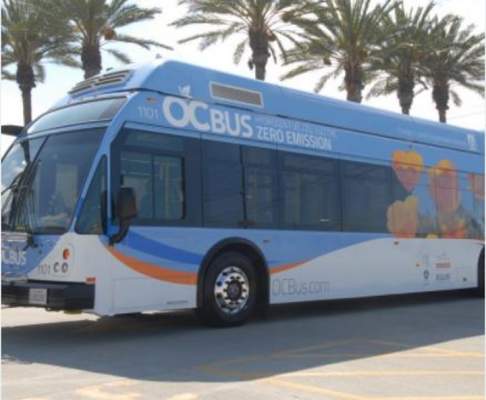
ORANGE – The Orange County Transportation Authority board this week approved purchasing 10 plug-in battery-electric buses for a pilot program to test how the buses perform on Orange County streets.
The contract with New Flyer of America, Inc. is for $10.4 million, with substantial grant funding helping pay for the purchase of the 10 buses.
The move is part of OCTA’s plan to convert the OC Bus fleet to 100 percent zero-emission technology by 2040.
Earlier this year, OCTA also began operating 10 hydrogen fuel-cell electric buses, and this new pilot will help determine which technology – or mix of technologies – will work best for Orange County moving forward.
It’s another important step toward zero-emission transportation technology for a balanced and sustainable future – one that will help bring even cleaner air quality to Orange County.
“This is a great opportunity for us to gather important data about the latest zero-emission technologies to ensure we continue providing the highest level of safe, reliable transit to Orange County riders,” said OCTA Chairman Steve Jones, also the Mayor of Garden Grove. “At the same time, we are helping provide an even cleaner environment.”
OCTA has already gradually transitioned its fleet over the years, from diesel-burning buses to clean-burning renewable compressed natural gas (CNG) buses with near-zero-emission engines. The state has set a requirement to transition to complete zero-emission transit within the next 20 years.
In June, OCTA approved a zero-emission bus (ZEB) rollout plan, which was submitted to the California Air Resources Board.
The plan is not a commitment to a specific type of technology. OCTA is testing both hydrogen fuel-cell electric buses and plug-in battery-electric buses to determine which ZEBs best meet OCTA’s needs related to operations, maintenance and cost, among other factors.
The 10 plug-in battery-electric buses are each the standard 40-foot length with capacity of up to 76 riders, (OCTA is currently limiting bus occupancy because of COVID-19). The buses have an estimated range of 200 miles between charges, which will allow them to run for a full day and be charged nightly at OCTA’s Garden Grove bus base.
Five of the 10 test buses are scheduled to run on a new Bravo! route between Anaheim and South Coast Metro in Santa Ana. The other five will operate throughout Orange County.
Five of the buses are funded by grants through the California Transportation Commission and SB 1, and through the Low Carbon Transit Operations Program (LCTOP) administered by Caltrans.
The hydrogen fuel-cell buses, which also create no emissions, began operating in January, when OCTA debuted its hydrogen fueling station in Santa Ana. In all, it represented a $22.9 million investment. More than half of that funding – $12.5 million – came from California Climate Investments, a statewide initiative that puts billions of cap-and-trade dollars to work reducing greenhouse gas emissions, strengthening the economy and improving public health and the environment – particularly in disadvantaged communities.
OCTA operates more than 500 buses in the regular OC Bus system across Orange County. For now, most of those buses run on CNG but OCTA is working toward the goal of producing zero emissions.
OCTA will begin phasing in additional zero-emission buses as part of future bus purchases beginning in 2023. At the same time, staff will continue to analyze emerging technologies and work with partners to secure funding for purchase, operations and maintenance of the buses.
The effort aligns with California’s Innovative Clean Transit Rule, a first-of-its kind regulation in the U.S. that sets a goal for public transit agencies to gradually transition to 100 percent zero-emission bus fleets by 2040. The Innovative Clean Transit Rule is part of the state’s comprehensive program helping to achieve California’s air quality and climate goals.
The hydrogen fuel-cell buses continue to be tested on routes throughout Orange County. The plug-in battery-electric buses are expected to begin operation in Orange County in late 2021.
About OCTA: The Orange County Transportation Authority is the county transportation planning commission, responsible for funding and implementing transit and capital projects for a balanced and sustainable transportation system that reflects the diverse travel needs of the county’s 34 cities and 3.2 million residents. With the mission of keeping Orange County moving, this includes freeways and express lanes, bus and rail transit, rideshare, commuter rail and active transportation

